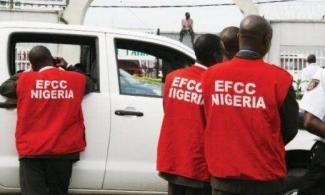
A Federal High Court sitting in Awka, Anambra State, has dismissed a suit filed by the Anambra State Government challenging the power of the Economic and Financial Crimes Commission, EFCC's power to investigate its finances.
Delivering judgment on the suit, Justice Nnamdi Dimgba held that the suit was factually and forensically lacking in merit, according to the statement issued on Wednesday and signed by Wilson Uwujaren, Head, Media and Publicity
In his judgment, Justice Dimgba stated that the EFCC has constitutional powers to investigate any act of economic and financial crime in any part of the country, stressing that neither the authorities of a State's House of Assembly nor Auditor- General of a State preclude the commission from performing its mandate as contained in the Constitution.
“In my view, the question posed is at large... Is the EFCC a federal agency exclusively for all purposes, or is it both a federal agency and a state agency for some other purposes? It all depends on the context to which the question has been posed.
“In the context of the case at hand, which is whether it is legitimate for the EFCC to commence investigative activities against the named officials of Anambra State Government as contained in Exhibit 1 concerning the manner of the management and utilization of the public funds of Anambra State, the question posed must be answered against the Plaintiffs and the corresponding reliefs sought denied.
"…binding judicial precedent existing is to the effect that the EFCC is an agency both for the federal government and for state governments as far as the combating of corruption and other economic crimes in Nigeria is concerned,” the judge was quoted as saying.
While agreeing with an earlier judgment that Nigeria practices co-operative federalism, Justice Dimgba added, “In the co-operative federalism practiced in Nigeria, the EFCC is a common agency empowered to investigate and prosecute offenders for both the Federal and state economic and financial crimes, and as such it qualifies as ‘any other authority or person’ empowered by Section 211(1)(b) of the Constitution to institute or initiate criminal proceedings”.
The judge added that “EFCC is the coordinating agency for the enforcement of the provisions of any other law or regulation on economic and financial crimes, including the Criminal Code and Penal Code. The Commission has powers under Section 13(2) of the EFCC Act to prosecute offences so long as they are financial crimes.”
While dismissing the action, the judge further said, “ I have also noted, and thus hold, that all the addressees of the EFCC letters (Exhibit 1) as fully described above, including all those which the EFCC by the letters referenced, demand that they should be released for interview for the purposes of obtaining the clarification needed for the Commission to establish if the offences which the Commission said it was investigating such as fraudulent misappropriation of funds and the like have been committed, all qualify as “persons” or , “authority” from whom by law, the Commission is entitled to receive information from. They are indeed, all subjects of the EFCC’s exercise of its powers under the law.”
The State government had approached the court presided over by Justice Nnamdi Dimgba to determine whether under the Federal System of Government, with the constitutional doctrine of Separation of Powers, "the appropriation, disbursement and or administration of funds belonging to a State Government is subject to investigation by the EFCC being an agency of the Federal Government."
The suit was a precipitate response to a series of letters of invitation by the Commission sent to the Secretary to the State Government (SSG) and the State Attorney-General seeking the release of officials of the state government to offer explanations in an alleged case of fraudulent misappropriation of funds in respect of data collection exercise for the administration of subsidy to smallholder farmers and alleged case of abuse of office and misappropriation of funds.